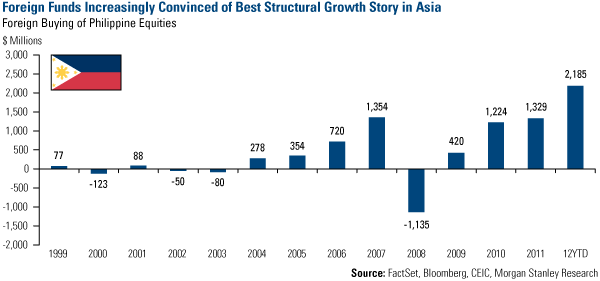Emerging Markets Radar (September 24, 2012)
Strengths
- China needs more subways, highways and sewage plants, and construction of those infrastructures will help the economy, Xu Lin, the head of the planning department at National Development and Reform Commission said this week.
- Malaysia’s CPI stayed flat at 1.4 percent in August as in July.
- The Federation of Thai Industries reported solid August auto production of 210,333 units (up 37 percent year-over-year), driven by strong domestic sales.
Weaknesses
- HSBC September Flash China PMI was 47.8 versus estimate 47.6 for August, which, though improved on a month-over-month basis, indicates that the economic activities still are contracting. However, new orders overall increased to 47.6 from 46.1.
- Taiwan August export orders fell 1.5 percent year-over-year, improving from the contraction of 4.4 percent in July. The market expects export orders in tech products to revive going forward due to iPhone 5 and Windows 8 ODM plays.
- Turkey GDP growth, which was 8.5 percent in 2011 and 3.3 percent in the first quarter of 2012, slowed down to 2.9 in the second quarter.
Opportunities

- Foreign investors have consistently put more money in Asia equity markets, such as the Philippines as shown in the graph above. Particularly, Association of Southeast Asian Nations countries are on the rise in consumer spending and infrastructure investments helped by an increasing middle class and growing government balance sheet.
- India opened retail and aviation sectors for foreign investment, cut the fuel subsidy by 12 percent and cut the withholding tax on local corporate bonds held by foreigners 20 percent to 5 percent.
- In a separate move, India’s central bank cut its reserve ratio requirement for the banks by 25 basis points, setting the stage for a rally in financials.
Threats
- The tension between Japan and China over disputed islands in East China and North Taiwan is escalating with some possibility of trade and military clashes.
- Credit Suisse remains cautious on the Polish banking sector, and cut 2012 earnings forecast by 13 percent due to cyclical pressures from lower loan growth and higher provisioning charges.
- President Putin was critical of the proposed budget for not incorporating provisions for several of his election promises. This higher expenditure will have to be financed through borrowing and/or higher taxes.













